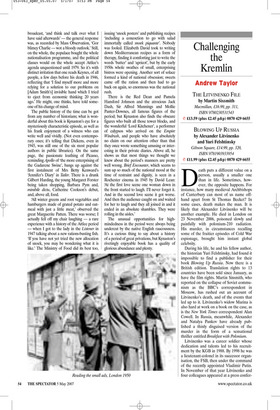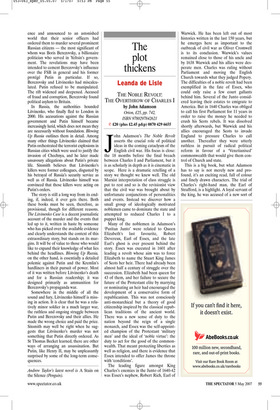Challenging the Kremlin
Andrew Taylor
THE LITVINENKO FILE by Martin Sixsmith Macmillan, £16.99, pp. 311, ISBN 9780230531543 ✆ £13.59 (plus £2.45 p&p) 0870 429 6655 BLOWING UP RUSSIA by Alexander Litvinenko and Yuri Felshtinsky Gibson Square, £14.99, pp. 320, ISBN 9781903933954 ✆ £11.99 (plus £2.45 p&p) 0870 429 6655 Death puts a different value on a person, usually a smaller one than in life. Sometimes, however, the opposite happens. For instance, how many medieval Archbishops of Canterbury can most of us name offhand apart from St Thomas Becket? In some cases, death makes the man. It is likely that Alexander Litvinenko will be another example. He died in London on 23 November 2006, poisoned slowly and painfully with polonium-210 radiation. His murder, in circumstances recalling some of the fruitier episodes of Cold War espionage, brought him instant global celebrity.
During his life, he and his fellow author, the historian Yuri Felshtinsky, had found it impossible to find a publisher for their book Blowing Up Russia. Now there is a British edition. Translation rights to 13 countries have been sold since January, as have the film rights. Martin Sixsmith, who reported on the collapse of Soviet communism as the BBC’s correspondent in Moscow, has rushed out an account of Litvinenko’s death, and of the events that led up to it. Litvinenko’s widow Marina is also hard at work on a book on the case, as is the New York Times correspondent Alan Cowell. In Russia, meanwhile, Alexander and Natalya Pankov have already published a thinly disguised version of the murder in the form of a sensational thriller entitled Breakfast with Polonium.
Litvinenko was a career soldier whose dedication and talents led to his recruitment by the KGB in 1988. By 1998 he was a lieutenant-colonel in its successor organisation, the FSB, then under the command of the recently appointed Vladimir Putin. In November of that year Litvinenko and four colleagues appeared at a press confer ence and announced to an astonished world that their senior officers had ordered them to murder several prominent Russian citizens — the most significant of whom was Boris Berezovsky, a billionaire politician who served in Yeltsin’s government. The revelations may have been intended to cement Berezovsky’s influence over the FSB in general and his former protégé Putin in particular. If so, Berezovsky and Litvinenko had miscalculated. Putin refused to be manipulated. The rift widened and deepened. Accused of fraud and corruption, Berezovsky found political asylum to Britain.
In Russia, the authorities hounded Litvinenko, who finally fled to London in 2000. His accusations against the Russian government and Putin himself became increasingly lurid, which does not mean they are necessarily without foundation. Blowing Up Russia outlines them in detail. Among many other things Litvinenko claimed that Putin orchestrated the terrorist explosions in Russian cities which were used to justify the invasion of Chechnya, and he later made unsavoury allegations about Putin’s private life. Sixsmith believes that Litvinenko’s killers were former colleagues, disgusted by his betrayal of Russia’s security service as well as of Russia. Litvinenko himself was convinced that those killers were acting on Putin’s orders.
The story is still a long way from its ending, if, indeed, it ever gets there. Both these books must be seen, therefore, as provisional, though for different reasons. The Litvinenko Case is a decent journalistic account of the murder and the events that led up to it, written in haste by someone who has picked over the available evidence and clearly understands the context of this extraordinary story, but stands on its margins. It will be of value to those who would like to expand their knowledge of what lies behind the headlines. Blowing Up Russia, on the other hand, is essentially a detailed polemic against Putin and the Kremlin’s hardliners in their pursuit of power. Most of it was written before Litvinenko’s death and for a Russian readership; it was designed primarily as ammunition for Berezovsky’s propaganda war.
Somewhere in the middle of all the sound and fury, Litvinenko himself is missing in action. It is clear that he was a relatively minor soldier in a much larger war, the ruthless and ongoing struggle between Putin and Berezovsky and their allies. He made the wrong choice and paid the price. Sixsmith may well be right when he suggests that Litvinenko’s murder was not something that Putin directly ordered. As St Thomas Becket learned, there are other ways of arranging an assassination. But Putin, like Henry II, may be unpleasantly surprised by some of the long-term consequences.
Andrew Taylor’s latest novel is A Stain on the Silence (Penguin).



































































































 Previous page
Previous page